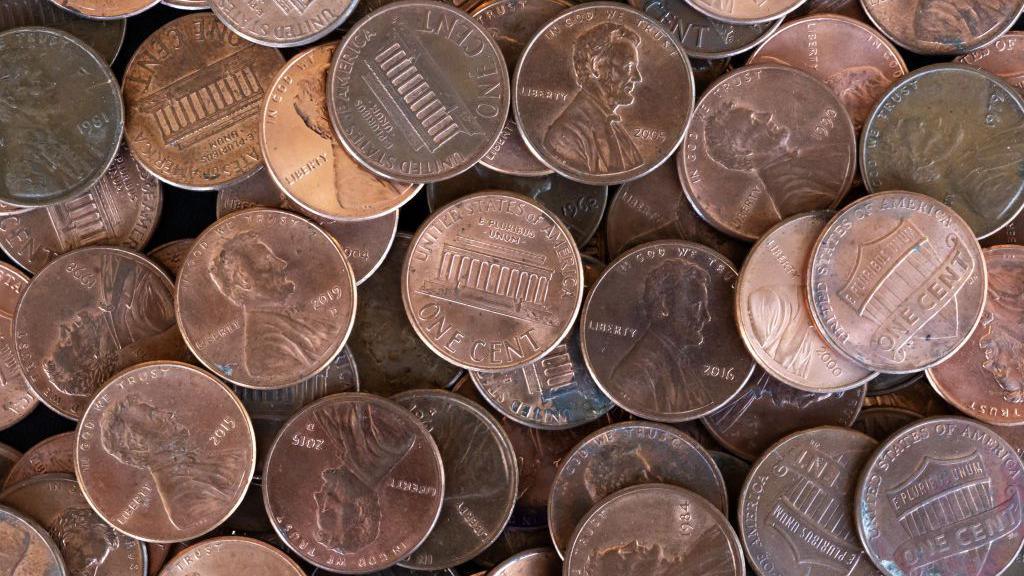US businesses are reportedly feeling the pinch due to a scarcity of pennies.
Following the reported cessation of penny production earlier this year, attributed to a decision by the previous administration, these coins are becoming increasingly difficult to obtain. Consequently, many retailers are now implementing a rounding-down policy for cash transactions, adjusting to the nearest five cents in the absence of specific federal guidance.
“That adds up really quickly,” noted Dylan Jeon, senior director of government relations with the National Retail Federation.
In February, then-President Donald Trump reportedly deemed the penny’s production wasteful and overly expensive, advocating via social media to “rip the waste out of our great nation’s budget, even if it’s a penny at a time”.
While reports indicate the US Mint officially halted penny production in May, the Treasury Department’s projections of shortages beginning in early 2026 appear to have been significantly accelerated. Banks are reportedly facing difficulties in obtaining pennies from the federal government, subsequently impacting businesses’ ability to acquire them.
“We first heard about the issue in late August, early September,” Mr. Jeon stated. “It’s really impacting any business that deals with cash payments.”
The current situation has left store clerks facing challenges in providing exact change for cash purchases.
Mr. Jeon suggests that a temporary solution involves retailers rounding transactions to the nearest five cents, enabling customers to utilize nickels.
However, he points out that certain municipalities, such as New York, mandate exact change, while others prohibit discrepancies between cash and card payments.
To mitigate legal risks and customer dissatisfaction, many retailers are reportedly opting to round down transaction amounts.
“You’re talking about losing up to four cents for every cash transaction across multiple stores across the country,” he said. “It’s unsustainable.”
In response, numerous stores are encouraging customers to utilize exact change and introducing promotions to incentivize the return of spare pennies.
Jeff Lenard, a spokesperson for the National Association of Convenience Stores, highlights convenience stores as particularly vulnerable to the shortage.
Convenience store chain Kwik Trip has announced it is rounding down to the nickel, which it says will cost it up to $3m (£2.3m) this year.
Mr. Lenard notes historical precedents for coin discontinuation in the US, including the half-cent, three-cent, and twenty-cent pieces. However, the discontinuation of the penny, a coin in circulation since 1793, represents a significant shift.
“People don’t want the penny until they can’t get it back in change,” he said.
Notably, the production cost of a penny is nearly four cents.
Mark Weller, executive director of Americans for Common Cents, argues that maintaining the circulation of pennies, composed of zinc and copper, benefits lower-income individuals who predominantly rely on cash transactions.
“These are people that don’t have the access to checking accounts and charge cards and banking services,” he said. “You hurting lower-income groups when you start rounding transactions.”
He further suggests that potential government savings from ceasing penny production could be offset by increased nickel production, given the approximately 14-cent cost to produce a five-cent nickel.
Observers of the penny situation advocate for federal guidance regarding rounding practices, transaction procedures, and general coin handling during the shortage.
“There will always be pennies out there, it’s just such a low-utilisation coin,” said Mr. Jeon. “People forget about them in their pockets, they lose them in their couch, they’re sitting in jars. Those are coins that aren’t making it into circulation.”
The US president says the new marble and gold fixtures are “very appropriate for the time of Abraham Lincoln”.
In two separate rulings, US judges said the plan to cut off Snap food benefits for millions of Americans is likely unlawful.
The monthly cost of health insurance could rise by 114% on average, according to health research nonprofit KFF.
Half of the major airports in the US were experiencing staff shortages
Carney told Trump the commercial, which quoted Ronald Reagan, was “not something I would have done”.

